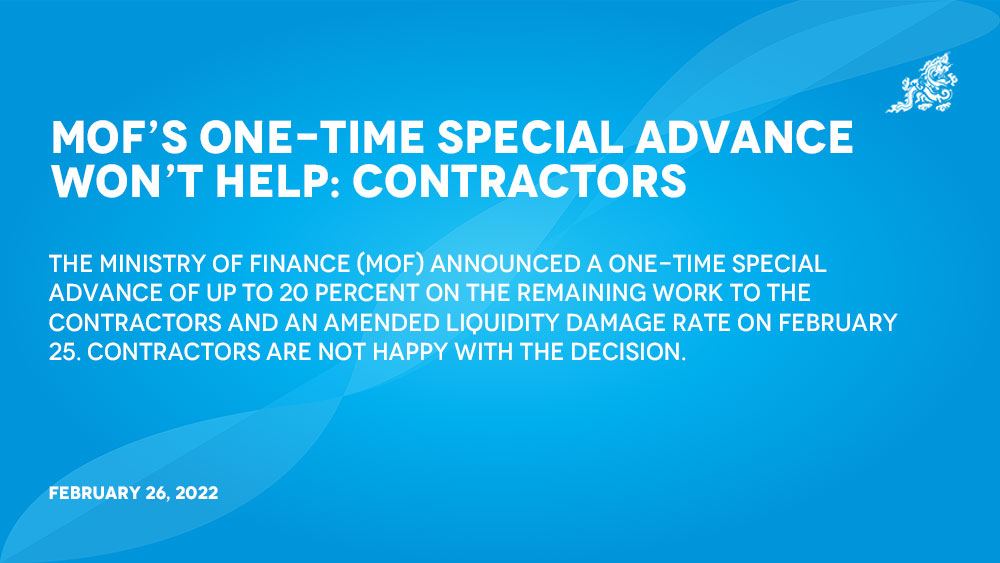Thukten Zangpo
The Ministry of Finance (MoF) announced a one-time special advance of up to 20 percent on the remaining work to the contractors and an amended liquidity damage rate on February 25. Contractors are not happy with the decision.
“It would be a relief measure to the contractors to ensure the construction projects in hand are completed on time and most importantly with quality,” the ministry stated, adding that the contractors are not able to process the running bills to meet certain mandatory expenses such as labour payments and material costs, as the agreed milestones are not achieved amidst the Covid-19 pandemic.
The ministry stated that to avail the one-time special advance, the contractor shall be mandated to furnish an equivalent bank guarantee.
A contractor said that if the contractors are to provide an equivalent bank guarantee, it is similar to availing a loan from banks with a mortgage.
Construction Association of Bhutan (CAB) executive director Tshering Younten said, “We requested an advance without a guarantee.”
A contractor said that most of the contractors do not have property for the bank guarantee, and about 90 percent of the contractors are at risk of not being able to complete the work on time.
He added that the contractors asked for the special advance because those who were awarded the work before the unforeseen Covid-19 are facing the cost escalation of construction materials by over 100 percent, and labour by 200 percent.
“We are requesting this of the government because special advances without a bank guarantee were provided by the Ministry of Health,” a contractor said.
It was learned that the Ministry of Health released an advanced budget of Nu 20 million (M) for the construction of Deothang hospital in Samdrupjhongkhar and Nu 20M for the Mother and Child Hospital in Thimphu.
The project manager of Deothang hospital, Dorji Rapten, said that the contractor was facing losses due to Covid-19 and submitted a note sheet to the ministry requesting the advance, stating that the contractors wanted to start the work.
“It was not like a 20 percent special advance, but we asked for Nu 30M and received Nu 20M in 2020,” he said, adding that it was through a mutual understanding with contractor and without a bank guarantee.
Dorji Rapten said that it was a combination of the effort of those who proposed and discussed with the parent ministry and the Gross National Happiness Commission, and the budget was released.
The MoF also amended the liquidated damages rate, which is 0.05 percent for every day of a delay, to the maximum of 10 percent of the initial contract price with effect from January 1, 2022.
It is applicable to all contracts whose liquidated damages start from January 1, 2022, irrespective of the commencement of the project, and if it is already entered by January 1, 2022, it applies to that portion of liquidated damage after January 1, 2022.
It does not apply to the contracts that already have exhausted liquidated damages before January 1, 2022.
However, it stated that based on the site progress, procuring agencies may initiate termination after exhausting the initial 100 days of the liquidated damage period.
Tshering Younten said that the liquidated damages earlier were 0.1 percent every day, which has been reduced to 0.05 percent. “The maximum 10 percent will be reached in 200 days now, compared to the 100 days before.”
Tshering Younten said that they requested that all the liquidated damage for the projects that are completed during the pandemic to be considered and refunded back.
However, he said that he also supports the government’s decision, and that if there are no penalties, the contractors may leave the sites and may not even work.
Tshering Younten said that the contractors are still hoping that the government will consider their earlier request on the cost escalation for the balance work carried out after August 24, 2021, and consider the quarantine expenditure of foreign workers.


